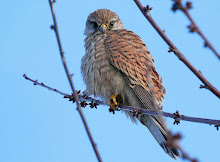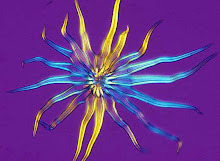Just when most of our flora finishes flowering, ivy comes into bloom and provides a last-minute autumnal energy top-up for insects like this drone fly (below, feeding on ivy pollen) and red admiral (above, drinking nectar), before the frosts arrive. To appreciate why its flowers are so attractive to insects, you need to take a really close look on a mild humid morning, when the disc at the centre of the flower is absolutely swimming in secreted nectar (see lower two photos) and newly open stamens are still full of fresh yellow pollen. It’s difficult to underestimate the value of this plant as an energy source for insects that hibernate, bearing in mind its wide distribution, the vast number of flowers produced on just a single plant and their long flowering period.
Freshly opened ivy flowers, oozing nectar and laden with pollen.























Wonderful closeup photography.
ReplyDeleteGreat close ups Phil, showing the detail.
ReplyDeleteMy back fence is covered in Ivy, and always attracting various insects.
I have a couple of large clumps of Ivy and they have been a buzz with insects for weeks. I did wonder what they could find in such tiny flowers and your great close up shots have answered that for me.
ReplyDeleteA wonderfully concise piece Phil, I observed exactly this on Saturday & was amazed at the number of insects feeding on the Ivy. I made a mental note to find out just what makes its so attractive to insects & you've provided me with the answer. Thanks so much. Linda
ReplyDeleteThanks David, the insects were so preoccupied with feeding that getting in close was easy
ReplyDeleteHi Keith, I deliberately planted some ivy on old tree stumps for attarcting insects in autumn... although you have to keep an eye on it, with its tendency to spread..
ReplyDeleteHi John, I think insects also appreciate them because they don't to move about much to feed - just wander from one flower to another - a lot of reward for not much effort
ReplyDeleteThanks Linda, wasps in particular seem to be attracted to all that sugary nectar, but every now and then something more exotic arrives
ReplyDeleteI find that what you have to say about the natural world wonderfully informative. The pictures are fabulous.
ReplyDeleteThanks for your kind comments oldcrow61 - it's a pleasure to have people like you to share it with..
ReplyDelete